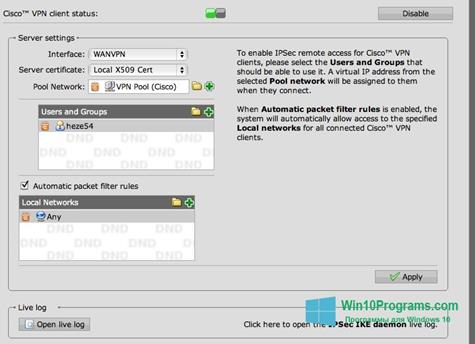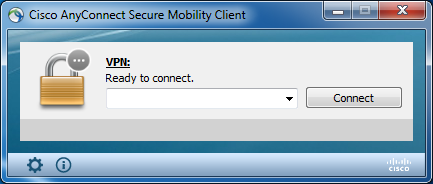
- #Cisco vpn client for windows 10 drivers
- #Cisco vpn client for windows 10 windows 10
- #Cisco vpn client for windows 10 software
- #Cisco vpn client for windows 10 trial
#Cisco vpn client for windows 10 drivers
Many older 32-bit (x86) drivers are not signed, because kernel-mode driver signing is a recent requirement for Secure Boot.
#Cisco vpn client for windows 10 software
While secure boot is a useful security standard developed by members of the PC industry to help make sure that your PC boots using only software that is trusted by the PC manufacturer, sometimes it gives us more problems than convenience. If your secure boot is NOT enabled by default, then skip this! 🙂įirst step you would need to tackle would be the secure boot that is offered on the newer hardware and Windows 10. Gentle Reminder 2: Where possible, you should execute the software programs below with Administrator rights, to avoid any access rights/execution problems later on. A “ clean” network stack is critical for success. This ensures a clean configuration for the guide to work properly. Gentle Reminder 1: Please uninstall any previously installed Cisco VPN Client software or DNE updates that you may have installed prior to this guide. Ok, now that we have got the disclaimer out of the way… If you are lazy (or too busy) to find the software listed below in the instructions, you can download the all-in-1 package from here for your convenience (hosted locally): Win10 All-in-1 (version 3, 2018), Win10 All-in-1 here (version 2, 2015-2017).Īs the usual disclaimer goes, with the ever changing OS updates and software patches, I will not be held responsible if anything goes wrong with your computer or hardware or software, or causes you to suffer any loss of any sorts, so do backup your data if you want to go ahead.
#Cisco vpn client for windows 10 windows 10
You can do like-wise by following the steps below, to ensure that your Cisco VPN Client continues to work well after migrating to Windows 10 OS.
#Cisco vpn client for windows 10 trial
After some fumbling, painful, repetitive, trial and error, finally I found the way to do it right.

Rebooting the machine does not help, trying all other solution does not help. Secure VPN Connection terminated locally by the Client. Most users will face the first error, which says: Many reported they can now work from home, or use a single machine to access VPN instead of two machines, or simply made their life much simpler! Thanks to the community, this tutorial has become a better one.)

( This tutorial is becoming even more robust as more and more reported success and provided additional tips to improve the process, and I have enhanced the tutorial, to make it as foolproof as possible for you. If you are looking for the Windows 8 guide for Cisco VPN client, visit this guide here instead. Faced with similar issue, I searched for possible solutions online and tried different ways of overcoming the issues, which is often a hit and miss affair. Yet, for some reasons, there are still users (like myself) who are not able to use the newer Cisco An圜onnect, as it might not be supported by their existing VPN infrastructure or some other reasons. This is because the legacy Cisco VPN-client is not supported under Windows 10 and as the client is EOL anounced, it probably will never be supported anymore. When the world moved to Windows 10, those would could not and would not move their legacy Cisco VPN software would have hit some problems while using VPN on their newer Windows 10 machines. Updated Jun 2020 (with amazingly high success rate!)


 0 kommentar(er)
0 kommentar(er)
